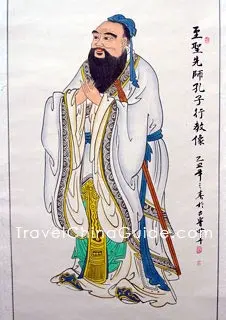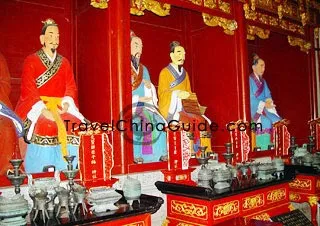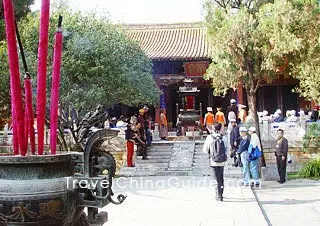Confucius
Living in the State of Lu (Qufu City in Shandong Province) during the Spring and Warring Period (770 BC - 476 BC), Confucius was a great educationalist, ideologist and the founder of Confucianism and private schools in China. He was born on September, 8th, 551 BC. Through his righteousness, optimism and enterprising spirit he has influenced greatly the character of the Chinese people from generation to generation.
 |
| The Portrait of Confucius |
Political Career
During his life Confucius decided to dedicate himself to serve his motherland. However, he only served the government for four years. Although he contributed greatly to the development of the country and was promoted, due to disagreements with the ruler his political career was ended. During the following fourteen years, he left his country and traveled around other countries to present his ideas to different rulers. Finally, because his ideas were not adopted, he returned home, still not recognized by the king.
Educational Career
Despite his not being successful in politics, his educational career was fruitful. He used most of his life to teach and help students solve problems. During his life about 3,000 students studied under his guidance. He not only created some effective teaching methods, but also proper studying techniques. For the rest of his life, he put in order some ancient literature and edited The Spring and Autumn Annals (the first Chinese historical record).
 |
| The Statues of Sages and the Virtuous |
Confucius taught his disciples by personal example as well as verbal instructions. He himself studied hard and pursued truth, dreams and a perfect personality. He had integrity and was kind, humble, polite and faithful to his country and people. He loved education and students, and was tireless in teaching. He always treated his disciples equally.
Due to his great reputation, many students from other countries like Qi, Chu, Wei and Jin came a long way to have him as their teacher. His students reached great achievements. In virtues, Yan Yuan and Zhong Gong, were the prominent ones; in language study, Zai Wo and Zi Gong were outstanding and in politics, Ran You and Zi Lu showed great talent. During the period of traveling in other countries, he brought his disciples. During this time, not only the knowledge of the disciples was increased but also their wills were disciplined. All his disciples respected him as their father and compiled his famous sayings in the book The Analects of Confucius.
He was a great teacher of noble morals and the first professional teacher in the Chinese history.
His ideas
His main idea is to administer the country with morals. Regarding personal relationships he once said that 'Do not do unto others what you would not want others to do unto you'. He advocated the syncretism of nature and human beings and suggested that people live harmoniously with nature.
In addition, he thought that a country should develop culture and economy at the same time. People should not only be benevolent to others but also cherish every object. In short, he aimed to establish a world of great harmony. For over two thousand years, Confucianism has guided numerous people's behavior and has been the mainstream of Chinese culture. In recent years, his great ideas have been accepted by many people all over the world.
|
|

